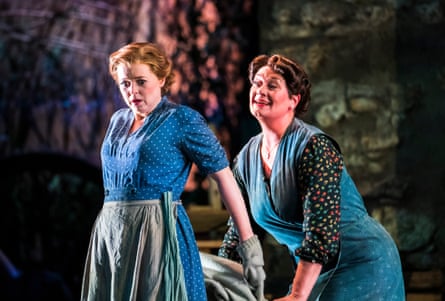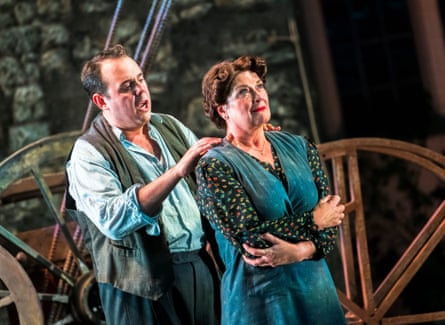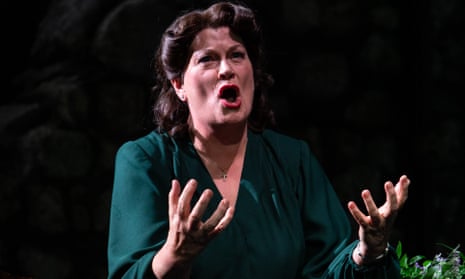Ask any opera lover to name an aria from L’arlesiana and the chances are that they will say Federico’s Lament. Enrico Caruso was the first tenor to sing the role of a young man driven mad by jealousy in Francesco Cilea’s 1897 opera. The popularity of È la Solita Storia del Pastore soon outstripped that of the rest of the work. That L’arlesiana is so rarely staged today is a mystery. Not only is the music wonderful but this is as much a family drama as it is a romance.
The woman who breaks Federico’s heart never appears on stage and is never named. Instead the female lead is Federico’s mother, Rosa Mamai, a widow and landowner in rural Provence. And the heartbreak described in her own big aria, Esser Madre è un Inferno (translated literally as “To be a mother is hell”), is altogether more complex. Rosa Mamai describes the torment of motherhood, from the pain of childbirth to long, lonely nights in which she didn’t dare to sleep while nursing her sick infant. Perhaps this explains her later behaviour. Her fear of losing Federico makes her obsessively overprotective and overbearing.
In opera, your voice type generally determines the type of roles you will play. A soprano can be an ingenue such as Janáček’s Jenůfa, or a dramatic focal point – think Tosca. A high mezzo-soprano may spend much of her life playing boys (“trouser roles”) – such as The Marriage of Figaro’s Cherubino or Octavian in Der Rosenkavalier – or a femme fatale like Carmen. Tenors are usually the heroes, while bass-baritones are most often villains, fathers or comic turns. When we look at mature mezzo-sopranos or contraltos we begin to find mothers and matriarchs, not all of them kindly.

As a Zwischenfach mezzo-soprano – literally, “between voice types” – I have had the joy of a wide variety of roles, from Leonora in Fidelio and the title role in Norma at the high end of my voice, to Dejanira in Hercules at the lower end. I have also played a lot of mothers. The mother as a character in opera is usually a secondary or tertiary role. I have played Gertrude, the exhausted mum in Hansel and Gretel, Madame Larina, mother to Tatyana and Olga in Eugene Onegin, Marcellina in The Marriage of Figaro, Spring Beauty in The Snow Maiden and Cornelia in Giulio Cesare. These are all supporting roles – it’s all too rare for a mother to be a character of major focus.
I have yet to play a mother in an opera written by a woman but some contemporary male composers have shown the mother in a more prominent, interesting light – take Julian Philips’s Knight Crew and Jonathan Dove’s The Monster in the Maze – than their predecessors. Perhaps these men feel more able to express their experience of mothers because of the times in which we live; it is certainly very fulfilling to play their women. Until Opera Holland Park cast me as Rosa Mamai, the strongest mother I had played was in Jonathan Dove’s Swanhunter. She has the strength of character to, very reluctantly, allow her son to follow his dream of heading north to find a wife, even though she knows it could destroy him, which it does. Her love for him, demonstrated in a wonderful aria that is sung from the bottom of her belly and her soul, brings her the power to rebuild his broken body and restore him to life.
Rosa Mamai is not in the traditional operatic mould. She appears very early in Act 1, using her maternal wiles to try to prevent her son from marrying the unnamed, unsuitable girl from Arles. She endeavours to wield influence over her elder son in the most extraordinary way while virtually ignoring her younger son. Cilea’s opera was based on Alphonse Daudet’s play, L’Arlesienne, which was in turn based on a short story from Daudet’s collection Letters from My Mill. Rosa Mamai’s character grew in significance and complexity in the stage versions.
In Rosa’s mind, Federico must always put her first. Everything revolves around her hopes, dreams and plans for him to marry well. She is ruthless in her manipulation of her goddaughter, Vivetta – encouraging a sweet and kind girl who is genuinely in love with Federico to tighten her corset, loosen her scarf and pout and flirt in order to attract her son. Is she a bad mother? I don’t think so, but she is certainly obsessive about Federico. Rosa’s younger son, known as L’Innocente, is always in the background. He receives no affection, emotional input, education or attention and seems almost to bring himself up.

After studying and rehearsing for Oliver Platt’s production of L’arlesiana, I have begun to think that in being left to his own devices, L’Innocente has at least not been ruined by his mother’s love in the way that Federico has. When he is described in the final act of the opera as “waking up”, could it be that he is simply coming into his own, having spent many years observing quietly and learning from the mistakes of others? Rosa’s reaction when L’Innocente finally speaks up is quite heartbreaking: she finally recognises him as an individual and says “You are of my blood”. What a strange thing to say to a child.
Cilea, who lost his own mother as a boy, brought remarkable intensity to this character. In the opera, Rosa might seem to us a typical Italian mother. In Daudet’s play, she might seem to be typically French. Perhaps the overbearing mother is a universal phenomenon. It’s as though having created a son, she sees him as an extension of herself. Her expectations and demands may come from a place of love but they are misguided and misplaced. I am mindful of an old expression I heard from my own mother: “A daughter is a daughter all her life and a son is a son till he takes a wife.”
For me it’s important to find the truth in any character I play – to ensure that she is believable and can draw sympathy from an audience, and not to present a caricature or a stereotype. People-watching – an invaluable pastime for any actor – is one of my favourite things to do; watching how relationships work, how people interact, observing the dynamics within relationships; how physicality and body language give away so much about the true feelings between people. As we work on this production, and I continue to explore Rosa Mamai, I am watching very carefully.

Comments (…)
Sign in or create your Guardian account to join the discussion